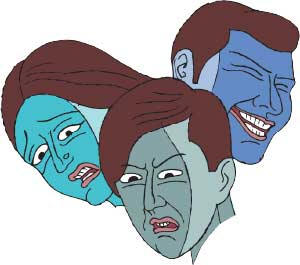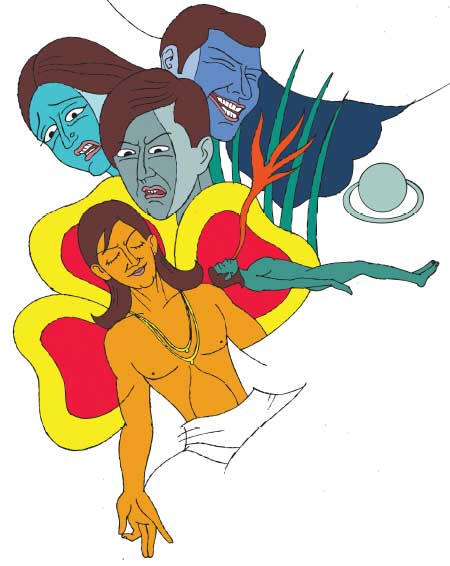·
Sakthi Vikatan
-
21 Jan, 2014
TreeInTheSeed06
Soul is Imperishable
Author: Sēvaratṉā
Dr. T.S. Narayanaswamy. Images: Aras
We can control the sense organs. When the sensual experiences affect the
mind, it (mind) breaks through
vairākkiyam (freedom from worldly desires) and wants to immerse
back in those sense experiences. Then, we can control them, helped by
intellect.
Bhagavan Krishna says in Bhagavadgita, having controlled the sense
organs, it is stupidity to entertain in the mind those experiences.
Therefore, mind needs to be controlled. How do we do it?
When we see an object, we react with like or dislike depending on our
intellectual power or our real state of mind.
A woman in the shop desires to buy a sari. How many saris does she see?
How many likes and dislikes the saris provoke in her mind? What is
rejected by one woman is liked and bought by another woman. These acts
are not intellect-dependent, but on taste and preference.
 Without
the participation of the sense organs, mind can experience happiness or
agony. Mind does not easily come within the ambit of wisdom or
intellect. Mind is the principal cause of distress in life. Mind is
intimately connected to the heart. That is why love, bond, friendship,
anger, and grief affect the heart a great deal. There is concurrent
affliction of the mind and heart.
Without
the participation of the sense organs, mind can experience happiness or
agony. Mind does not easily come within the ambit of wisdom or
intellect. Mind is the principal cause of distress in life. Mind is
intimately connected to the heart. That is why love, bond, friendship,
anger, and grief affect the heart a great deal. There is concurrent
affliction of the mind and heart.
Not just that. Mental distress afflicts digestive and evacuative
functions.
State of mind or personality is changeable from person to person. Birth
history, family circumstances, knowledge, childhood experiences… affect
the mind and personality. Brain disorders afflict the state of mind.
That is why we call them mental patients.
Body is important; intellect and mind are more important. Ātmā, the
inimitable power, orchestrates all these entities, standing apart from
them and their acts.
Āṉmā
is a powerhouse. It is a hypostatic power. It gives sustenance to the
body. Once it goes, the life goes. That
is death.
Āṉmā
is the dynamic power capable of energizing and activizing the bodily
organs and functions. Āṉmā
does not take responsibility, credit or blame for its induction of
successes and failures, desires and bondages, and joys and agonies.
As an example, let us take electricity, which passes along two wires
from one end to the other end. What is connected on the other end
determines the power and function of the electricity.
If electricity is connected to a refrigerator, its contents become cold.
If it is the hot iron, it helps remove the wrinkles in the clothes.
The light bulb emits light. When connected to a tape recorder,
sound is produced. When connected to TV, sound and picture appear. The
connected appliances bring out the functions of electricity, variable
from appliance to appliance.
Likewise, in the body made of five organs, Āṉma, the unique power,
expresses the disparate functions of various organs. They differ from
man to man, depending on time, circumstances, mental state,
personality…
When the electricity is cut, the appliances do not work (go dead).
Likewise, when Āṉma separates from the body, it becomes useless,
lifeless and dead.
There are many explanations for birth and death in the scientific sense.
Spirituality, the true knowledge explains birth and death in a different
dimension.
Man’s body is made of five great elements: Earth, water, fire, air, and
ether. They come together in a sequence and in particular proportions.
The body is a conglomeration of disparate elements. When Āṉmā
enters and stays in the physical body, a universe of human faculties
appears and becomes active. That is birth.
When Āṉmā
(soul)
leaves the body, the dead body is incinerated or buried, breaks up with
the release of the great elements, which unite with the respective
Great Elements. The bones and muscles unite with the earth, blood and lymph
with water, body heat with Agni or fire, the breath with the air, and
the empty spaces of the body with ether.
The five elements come together to make the body and go back to
them upon death. The scientists accept the explanation.

Indestructible Āṉmā
appears with birth (in a corporeal body). It does not disappear with death. It enters another
body and takes birth in an embodied form. Or it attains or merges with
God. Therefore, Āṉmā
is the highest. It has no bonds. It has no Malams or impurities.
Bhagavan says in Gita, ‘Body
dies, Āṉmā
is indestructible (lives forever).’
Ātmā is Braḥmam;
This Braḥmam is Ambrosia;
Eternal; indestructible.
Ātmā is Satyam (Truth);
It is eternal in existence;
It is a form of truth.
He who knows Ātmā lives without fear.
--Prajāpati
Vidya
